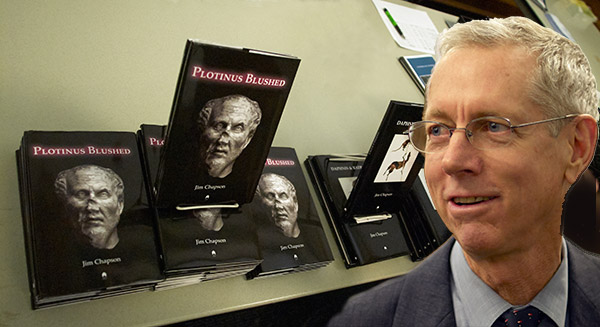National Poetry Month 2020
Born in Honolulu in 1944, Jim Chapson attended San Francisco State University and received his MA in 1968. With his partner, the Irish poet James Liddy (1934–2008), he moved to Milwaukee in 1976 and taught in the UW-Milwaukee English Department as an adjunct until 2016. He served as Poet Laureate of the City of Milwaukee from 2014 to 2016. He spends most of his time reading, writing and shopping at Whole Foods.
I once wrote that Jim’s poems move deftly between razor-sharp satire and passionate spiritual concern. I’ve also been close friends with him for many years and understand how important he is to his former students and poets in Milwaukee.
Paul Vogel: What was growing up in Hawaii like? What does your haole identity mean to you?
Jim Chapson: On a layover in Honolulu, on his way to Australia in 1989, Vice President Dan Quayle told reporters some surprising facts he had learned about Hawaii: “It is in the Pacific,” he said. “It is part of the United States that is an island that is right here.” The disconnect between Hawaii and “the mainland” (as we called the North American continent) was psychological as well as geological: to the Polynesian Ancestors, Hawaii was a sacred land newcomers would never understand, while to most mainlanders it wasn’t a real place at all, but an insubstantial confection of Hollywood kitsch. This might account for my lifelong sense of alienation everywhere.
PV: What were you doing in San Francisco in the 1960s?
JC: Encouraging the responsible use of psychedelic drugs. From 1964-68 I lived in Haight-Ashbury, on the corner of Ashbury and Page, one block north of the intersection that gave the neighborhood its name. In retrospect, one sees the naïve idealism and unwarranted optimism (the body count in Vietnam rising daily), but at the time there was a feeling something new was happening, and was about to happen, as if San Francisco might in an instant be transformed into the New Jerusalem, and everyone would assume their natural angelic form. But outside the city, people felt differently; for example, John Ashbery once remarked that he was often discomfited in the ‘60’s hearing people saying, “Hate Ashbery.”
PV: What teachers were important to you?
JC: My favorite teachers in high school were my freshman English teacher, Mr. Anderson, and my chemistry teacher, Mr. Johnson, both of whom were fired halfway through their first year. From them I learned not just poetry and chemistry, but that unconventional teachers are seen as a threat by the ruling powers. Reading Plato in college only confirmed this.
PV: What brought you to Milwaukee?
JC: Destiny. Early one morning, the day after high school graduation, I was walking on the white sand of Kailua beach, looking out over the blue water towards the northeast. I knew that 2,500 miles away was the mainland, and that my future was there, in that land of exotic deciduous trees: Maples, Elms, and Oaks; where the sky congealed in winter; where boys and girls were named “Dick” and “Jane” and had dogs named “Spot.” I knew, in short, that my future lay in that mild utopia of peaceful fulfilment which is the midwest. And so it came to pass.
PV: Do you have a theory of poetics?
JC: Most certainly.
PV: What are you reading these days?
JC: At the moment, the books piled up on my desk and couch include works by Lydia Davis, Evagrius Ponticus, Wallace Stevens, André Louf, George Oppen, Isaac of Stella, Joy Williams, Andre Sinyavsky, Mengzi, Peter Altenberg, Maria Gabriella Llansol, Dorotheus of Gaza, Diane Williams, Bernard of Clairvaux, Valentin Katayev, Jonny Lohr, John Cassian, Eamon Duffy, and Adam Zagajewski
PV: You often reference religious texts in your poems, but which religion is the right one?
JC: Yes.
PV: As life on this planet comes to an end, how can one come to know God?
JC: Life on this planet will come to an end for each of us long before the earth is engulfed by the sun; coming to know God is unavoidable, no matter how much one might wish otherwise.
PV: Do you ever tire of the literary life?
JC: Literary life?
PV: How do your dreams inform your poetry? Do dreams mean anything?
JC: One of the early church fathers (Clement of Alexandria?) held that Adam in paradise slept without dreaming, and the desert fathers considered dreamless sleep a sign of psychic integration; visions, of course, are a different matter.
More on the poet can be found at Dispatches from the Poetry Wars: https://www.dispatchespoetrywars.com/commentary/on-the-great-cream-city-poet-jim-chapson/ https://www.dispatchespoetrywars.com/poetry/11poems/


